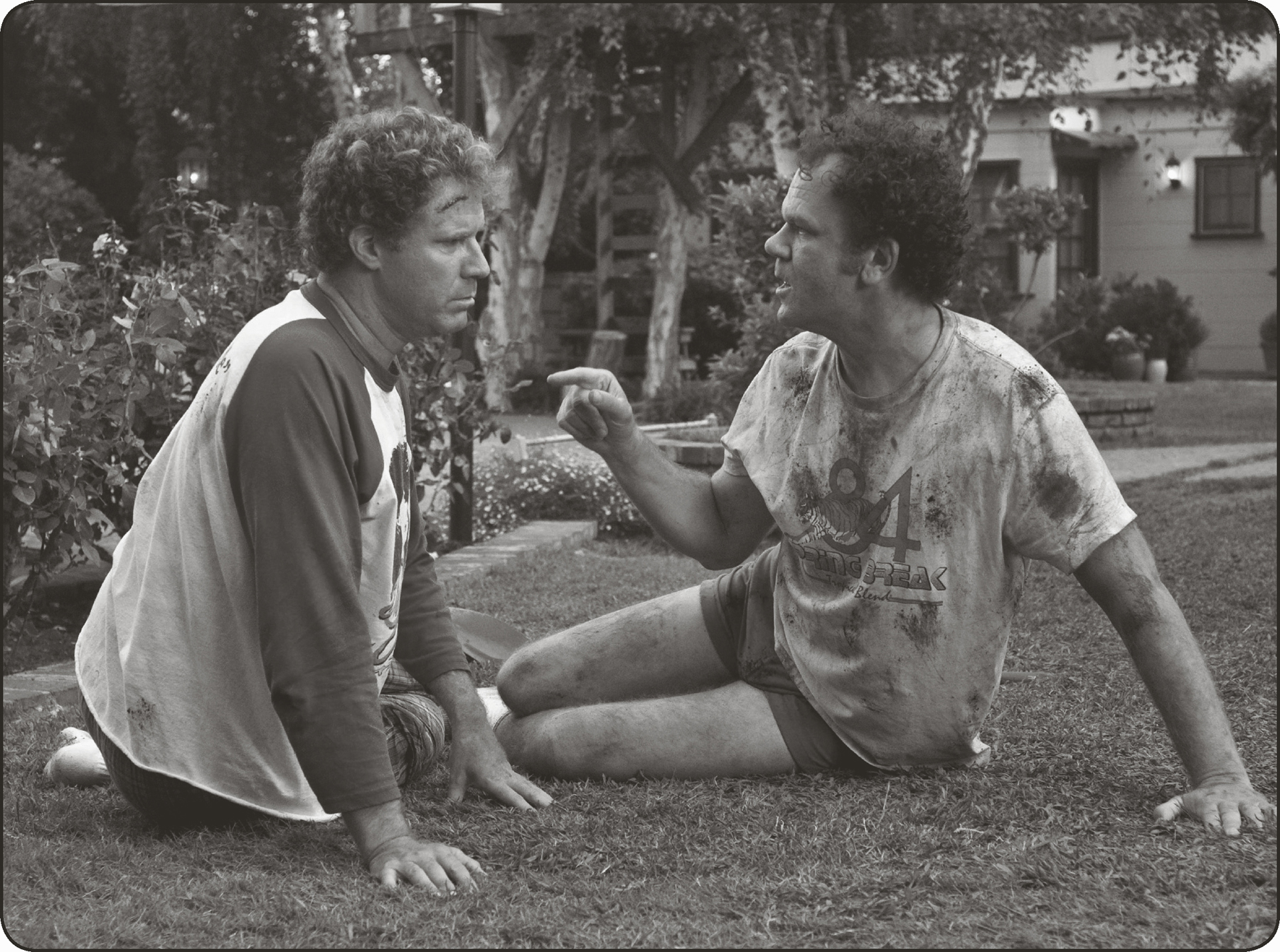CRITIC ESSAY
STEP BROTHERS 2008
 55%
55%
Directed by Adam McKay
Written by Will Ferrell and Adam McKay
Starring Will Ferrell, John C. Reilly, Mary Steenburgen, Richard Jenkins, Adam Scott, Kathryn Hahn
Critics have a hard time praising immaturity. That’s on us, not on Step Brothers, which arrived in multiplexes a little over a decade ago, made a decent amount of money (less than Talladega Nights: The Ballad of Ricky Bobby), and that now seems like a stealth comedy classic. Immensely talented actors behaving like sweaty, obnoxious twelve-year-olds for no good reason—that’s difficult to defend. There are several reasons for this, some legit, some not. Being a critic sometimes imbues one with a certain professional sobriety, a willingness to dive into context, history, form, style. Being silly never helps our cause. Championing silliness, a fine distinction, can be dangerous.
Why is Step Brothers Rotten? It’s only Rotten on Rotten Tomatoes—not at parties, job interviews, or in any situation that calls for somebody to rhetorically ask, “Did we just become best friends?” Mathematically, it’s a close call at 55%, since there were a number of reviewers who got it right, including yours truly. But the naysayers held sway. Roger Ebert, usually the most unpretentious of critics, sniped, “In its own tiny way, it lowers the civility of our civilization.”
Did it? One can only dream. The revulsion that met Step Brothers (Ebert wasn’t alone) ignores what the film does well. It evokes with pitch-perfect clarity a certain age, just before adolescence, when a boy is more prone to cry than lash out. (In one standout scene, ugly-crying is exactly what happens.) Will Ferrell and John C. Reilly, as Brennan and Dale, characters pushing forty, are still somehow stuck in that younger moment; it’s never explained. They collide when their separately divorced parents (Mary Steenburgen and Richard Jenkins) strike up a sweet middle-aged romance.
Ferrell and Reilly developed the surreal story with director Adam McKay in marathon sessions of improvisation. They found room for everything they could remember from junior high: getting dumb kicks from doing karate in the garage with pumpkins and a samurai sword; precariously stacking bunk beds into a tower, an accident waiting to happen (“So much more extra space in our room to do activities!” says Brennan, waiting for an elder’s approval). There’s a drum set that can’t be touched, under pain of death. (It will be touched, though, by a scrotum.) You can see the actors’ physical prep work in Reilly’s tighty-whities–clad rooster strut or Ferrell’s slightly shy reservation, the delicacy of a kid who’s used to being called gifted.
This isn’t the feel-good magic of Tom Hanks getting Big or Jamie Lee Curtis morphing into a mopey teenager in Freaky Friday. Step Brothers has no deep moral to impart; its cross-generational wisdom is limited to Jenkins’s “Don’t lose your dinosaur” speech (i.e., hang on to those Chewbacca masks). Brennan and Dale just want to make fart jokes, watch Cops, and maybe get around to recording their rap album. Putting on a defiantly infantile spectacle is the film’s raison d’être. Even more than Anchorman, it crystallizes Ferrell’s shouty-man brand of comedy. Maybe that’s why Step Brothers pissed off critics. There’s nothing nourishing about it.
But in asking us to accept these awkward boy-men—and we do, through a stupefied veil of trainwreck magnetism and the distant recognition of our own twelve-year-old selves—Step Brothers ends up making a mockery of adulthood, and that’s quietly radical. Is being a grown-up such a great thing if it means turning into an asshole like Brennan’s older brother Derek (Adam Scott, the film’s smarmy secret weapon), a Nazi-like jerk who conducts his family through an a cappella version of “Sweet Child o’ Mine”? Should one’s ultimate goal be making bank at the fucking Catalina wine mixer?
You either know these phrases or you don’t, in which case I envy you, because you get to experience Step Brothers for the first time, a transformative experience. Brennan and Dale become our unlikely heroes, tugged down the road of phony maturity and nearly converted into stiff, inflatable versions of themselves before gloriously reverting in the film’s final jaw-dropping minutes. Did Hollywood actually greenlight a scene in which Brennan finds himself on the toilet and out of paper, reaching for the bathmat? (The subsequent shot of him emerging from Costco with a brick of back-up rolls, triumphantly pumping his fist, is everything you need to know about this movie.)
And now, of course, Step Brothers—like Mike Judge’s Idiocracy—has gained the additional resonance of being prophetic: a celebration of over-indulged, tantrum-pulling, developmentally arrested boys who might be kings one day. “Is there any doubt Dale and Brennan would love Trump?” director McKay told Decider in 2017. “And their parents would hate him?”
McKay, meanwhile, has moved on to Oscar-friendly fare like The Big Short and Vice. Step Brothers’ then up-and-coming producer, Judd Apatow, carries the mantle of socially sharp comedies best exemplified by The Big Sick and Lena Dunham’s Girls. Will Ferrell and John C. Reilly have since reunited for Holmes & Watson (don’t bother), but they still get asked about Step Brothers more than any other film.
Rotten Tomatoes’ Critics Consensus Step Brothers indulges in a cheerfully relentless immaturity that will quickly turn off viewers unamused by Ferrell and Reilly—and delight those who find their antics hilarious.
